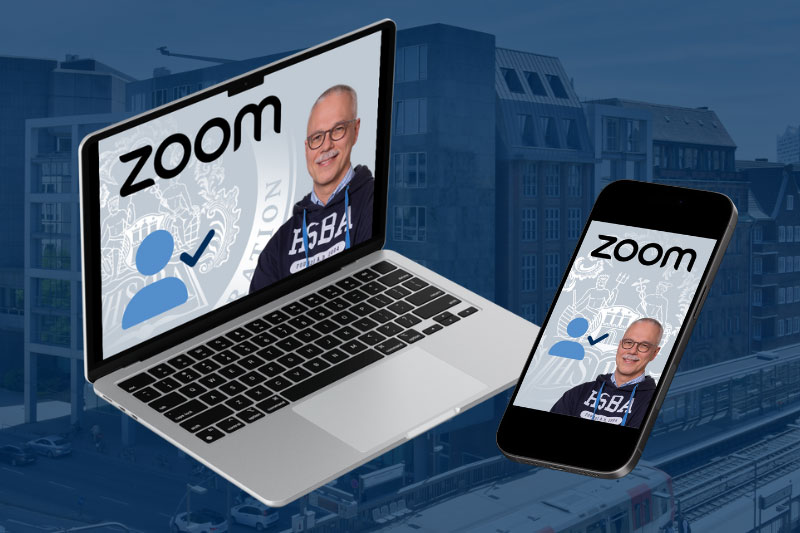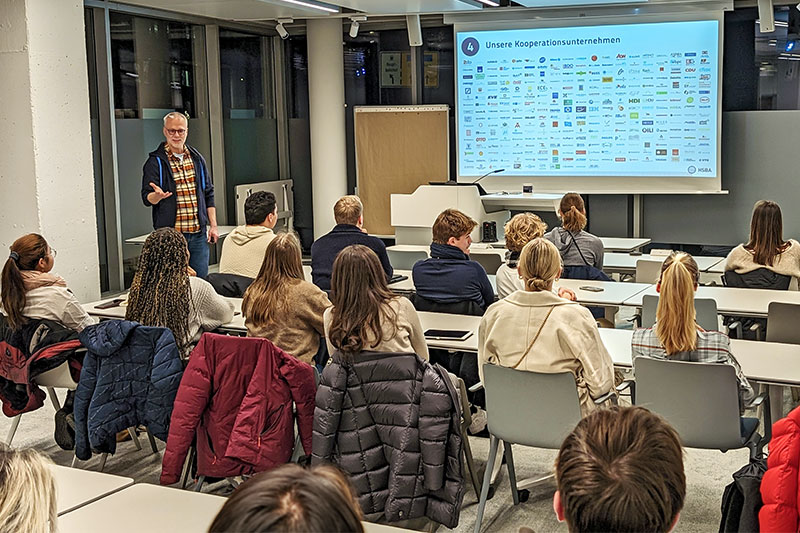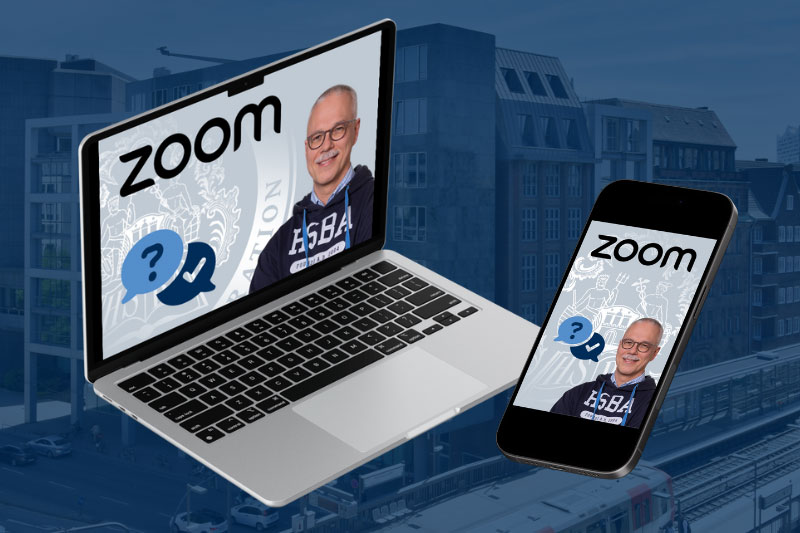Please activate Javascript in your browser to use this service on this page.
The academic head Prof. Dr. Ninnemann explains the focus and the special features of the dual undergraduate degree programme in Logistics Management.
The dual study programme Logistics Management offers practically oriented Business Administration studies with a special focus on the logistics sector, combined with simultaneous systematic in-company training. It provides not only the fundamentals of Business Administration, but also selected contents from the specific logistics angle, adding modules such as Supply Chain Management, Transport Planning, and Production & Warehousing Logistics. The cooperation partners are mostly logistics companies.
Bachelor students rate HSBA above average and are very satisfied with their studies.
Our dual university is in the top group in 12 out of 12 categories.
You can find more information here.
The co-operative programme integrates phases of theory at the university (on average 32 weeks a year) and practical phases of training in their training company (on average 20 weeks a year).
Students acquire practical business administration know-how, specialising in logistics with industry-specific learning modules. Special attention is given to method skills. The foundations of business administration knowledge are laid in the first year of the programme, together with an introduction to logistics, plus method modules. As the programme progresses, there is increasing emphasis on logistics-specific modules.
Teaching of basic mathematical knowledge, transfer of economic questions into mathematical approaches and application in practice.
Legal accounting requirements, bookkeeping procedures, charts of accounts, accounting processes incl. year-end accounting; problem-oriented application and evaluation of full and partial cost accounting.
Students will learn the most important definitions of logistics and supply chain management as well as the development of logistics. In addition, the course provides a first insight into strategies in the logistics market as well as green topics and innovations in logistics.
Acquiring basic knowledge of business informatics using operational information and application systems for computer-aided design, control and processing of business processes, the fundamentals and potential uses of databases and their implementation in companies.
Principles and foundations of business research, examination of long-term economic conditions (megatrends), examination of political, legal, ecological, socio-cultural and technological factors.
Application of statistical concepts, in particular probabilities and distributions, samples, significance, causality, correlation, linear regression.
Understanding of the fundamentals and methodology of microeconomic theory, assessment of the economic impact of economic developments, public sector activities and political measures on the behaviour of companies, households, market outcomes and economic prosperity.
Understanding how companies raise money to fund their investments, recognising the role of the financial manager in a company and the impact of financing decisions on the market value of a company.
Acquiring a holistic academic and theoretical understanding of marketing management, its main components and how to apply this knowledge and expertise to real business situations.
Get to know supply chain structures and strategies, recognise the effects of demand and supply management in supply chains, and identify and apply concepts for dealing with imbalances and dynamics.
Fundamentals of market research and data collection, development of questionnaires for statistical surveys, time series analysis, cluster analysis, software applications.
Acquiring the basic knowledge needed to implement projects on time, within budget and to the required quality standards. Gaining an overview of the most fundamental tools and methods of project management. Independently structuring, planning, controlling and managing projects of medium complexity.
Develop an understanding of warehousing and inventory management, and understand and apply processes and methods in this context.
Teaching selected approaches, methods and instruments of personnel management and leadership, analysing common personnel and leadership situations, applying them to current challenges in practice.
This module focuses on the effective and appropriate use of IT systems to support people and processes in maritime and logistics companies. Case studies are used to demonstrate how technology can be used and operational efficiency improved.
Operations management: fundamental insights into the physics/logic of operations, recognising OM problems and finding suitable methods to solve them.
Operations research: understanding the different types of optimisation methods and their advantages and limitations in practice.
Get to know basic strategic concepts, selected process, organisational and business model innovations, as well as innovative approaches in new and existing companies, get a ‘big picture’ overview of companies and their capabilities, and develop an understanding of change.
Understanding of organisations, exploration of organisational theory, familiarisation with dimensions that describe specific characteristics and structures of organisational design.
Familiarisation with the basics and systematics of national and international transport law in order to understand the prerequisites and legal consequences of the traffic law standards as well as the interaction of the various regulations in a practical case.
Students will learn the basics of transport logistics, which includes all relevant modes of transport such as rail, road, sea and inland waterways. They will also become familiar with transport-related logistics concepts and gain insights into transport policy aspects.
Introduction to international commercial arbitration law, international commercial law and competition.
Get to know the fundamental concepts and strategic advantages of responsible and sustainable leadership, get to know and apply key terms, theories, strategies and management models of sustainability, develop your own sustainability strategy.
A minor comprises three courses or 18 ECTS and takes place in the 5th and 6th semester.
You can choose from a wide range of current topics. The electives are reorganised every year.
Since the Bachelor thesis is time-intensive and individual, it can be written in different semesters. The Bachelor's thesis can be registered if 120 ECTS can be proven.
A minor comprises three courses or 18 ECTS and takes place in the 5th and 6th semester.
During the simulation game, students will combine the knowledge and skills from various modules in a simulation that involves managing a manufacturing company for several years.
Since the bachelor's thesis is time-consuming and individual, it can be written in different semesters. Registration for the bachelor's thesis is possible once 120 ECTS can be proven.
In the 3rd year of study, you have the opportunity to specialise by choosing a minor.
A minor comprises three courses or 18 ECTS and takes place in the 5th and 6th semester.
You can choose from a wide range of current topics. The electives are reorganised every year.
The general electives give students the opportunity to develop their individual knowledge and skills further. The offering ranges from social skills and IT seminars to studium generale events and smaller electives where students can tackle selected business administration content in a more in-depth manner. Foreign language courses are also on offer on an extracurricular basis.
A special highlight for all students is the study trip. The excursions, which span several study programmes and include numerous company visits and lectures, are organised independently by the students. Current topics such as digitalisation, the start-up scene in Silicon Valley or emerging countries frame the content of the individual destinations.
The Minor Advanced Studies in Logistics Management programme offers four deep dives into selected areas of logistics. The focus is on issues in the areas of maritime supply chains, urban logistics and production logistics. Case studies and practical applications are used to deepen students' understanding of content from selected basic lectures.
The Minor in Business Accounting combines the basics of business administration with the special requirements in the field of auditing and consulting. 3 Modules: Auditing 1, Taxation 1, Audit-related services.
Tax consultancy firms are important partners for companies, providing support in tax matters and tax optimisation. The minor in Business Taxation provides the theoretical foundations and insights into the work of a tax consultant in various industries. The course of study lays an essential foundation for a future career in tax consultancy.
The minor builds on the content of the modules Marketing Management, Statistics, Quantitative Methods and Science & Trends and represents a component of the two majors Marketing & Customer Insights and Sales & Customer Insights.
The minor builds on the contents of the module "Fundamentals of Business Informatics" and imparts basic knowledge of digitalisation. 3 modules: Digital Business Strategy & Implementation, Digital Process Innovation, Algorithmic Design and Implementation.
The minor in Digital Media Management imparts subject- and media-specific knowledge that is relevant for media and communication management. Modules: Media Management, Online Marketing Intelligence, Content Development.
The Minor Finance is related to the modules Mathematics, Statistics, Accounting and Principle. 3 modules: Finance Basics, Risk Management, Mergers & Acquisitions.
The minor consists of 3 modules: The Insurance Business Model – Functionality and Risk Management Approaches, Strategic Management – Starting Points for Insurers and Intermediaries, and Digital Business Models, Innovations and Digital Business Approaches in the Insurance Industry.
The minor builds on the contents of the Marketing Management and Quantitative Methods module. 3 modules: Customer Management & Sustainable Marketing, Sales & Retailing Management, Data Science & Artificial Intelligence.
The minor in Media Transformation imparts subject- and media-specific knowledge that is relevant for media and communication management. Modules: Media Markets & Products, Communication & Public Relations, Technologies & Content Production.
The minor in auditing combines business fundamentals with the requirements of auditing and consulting. Auditors review accounting and advise top management on the future viability of the company. The course of study provides theoretical foundations and insights into the work of an auditor in various industries, thus laying an important foundation for a future career.
The minor builds on the content of the Marketing Management and Quantitative Methods modules and is a building block for the Sales & Customer Insights major.
The Minor in Shipping provides maritime and shipping-specific knowledge relevant to working in the maritime industry and specifically in shipping companies. Theory, practice and case studies are closely interwoven. Modules: Shipping Markets, Sustainability & Business Models; Shipping Policy, Law & Insurance; Ship Finance, Case Studies & Projects.
As one of the global megatrends, Sustainability comprises various opportunities for businesses. The Sustainable Innovation minor covers strategic implications of the topic and well as innovative new business models. 3 modules: Sustainable Business Models, Sustainable Supply Chains, Sustainable Innovation Camp.
Graduates of the Logistics Management degree programme have comprehensive knowledge in the field of supply chain and logistics management. These skills make them desirable employees in various industries such as trade, automotive, retail, or manufacturing. Whether in supply chain management, procurement, production planning, transportation and warehousing, or consulting: with a dual degree in Logistics Management, you can advance to leadership positions or work in international companies.

At HSBA, he was known and loved as a dedicated student speaker, focused student and entertaining host of the HSBA Insights event series: Julian Thormählen was one of the first to study Logistics Management (BSc) at our partner company Airbus from 2019 to 2022. Since his successful graduation, he has been responsible for the parts supply of Airbus' final assembly lines in China and the USA as Global Material Manager. We talked to him about his Logistics Management studies, his daily challenges and his personal study highlights.
Dear Julian, congratulations on your new position! Since you have your Bachelor's degree in your pocket, you are Global Material Manager at Airbus, what exactly does that mean? What do you do all day long?
As Global Material Manager, I am responsible for the supply of parts to the final assembly lines in China and the USA. My colleagues and I are the interface between purchasing and logistics on site and ensure that the aircraft parts are available in time for the start of the station. Especially in times of supply chain crises caused by Corona or the aftermath of the Ever Given in the Suez Canal, this means new challenges every day. Because a production stop must be avoided at all costs.
Why did you actually want to study Logistics Management? And how did you find Airbus?
For some time now, I have been interested in the topic of traffic, transport and logistics in general, especially from the point of view of today's challenges (climate, urbanisation, etc.). Logistics as a degree programme offers the opportunity to receive a broad education in business administration, but at the same time to specialise at an early stage.
In my application phase, I saw Airbus as a global company as an ideal partner, as it offers sufficient resources and opportunities to develop broadly. And all this on the basis of an exciting product.
How would you describe the training at Airbus, in which areas do you actually work at Airbus after graduation and what is the support like?
The nice thing about Airbus as a partner company is the flexibility to go into any area you can imagine. This ranges from production-related areas in Finkenwerder, to management staff positions, to an assignment at the Toulouse plant or Mobile, AL in the USA, for example. I received a friendly welcome in every area, as "dualis" are always welcome. So if you express your wishes and ideas, address them to the right people and pursue them with vigour, there are hardly any limits at Airbus.
Did your studies prepare you well for the working world and your current job?
Above all, the practical part of my studies was worth its weight in gold for my current job. As a high school graduate, I stumbled straight into my studies and was initially a little overwhelmed by the new environment. Over time, however, I was able to get used to the processes and the working environment, improve steadily and now start my job as a fully-fledged team member without a long training phase. Of course, we were given the theoretical and methodological basics during our semesters at HSBA, which made for a well-rounded package.
What do you remember most fondly when you think back to your studies?
The moments and memories with my fellow students are particularly special about my time at university. Even if Corona threw a spanner in the works, the numerous parties, sporting events and breaks were the ideal balance to the often stressful everyday life of studying.
Another very special experience was my assignment abroad at the Airbus final assembly line in Mobile, Alabama. Those were definitely the most educational and exciting three months of my studies.
Your advice for other dual students / Logistics Management students at HSBA?
Just do it! Enrolling at HSBA is the first step towards a promising career in global business. Then it is up to each and every individual to take their own future into their own hands and shape it according to their own wishes. In doing so, one should not wait for success to be dropped in one's lap. However, as soon as the goal is in sight, the dual study programme at HSBA offers the best framework for achieving it with your own steps. I am convinced of that.





Do you have questions that you would rather discuss with our students? In our Ask a student format you will find contact persons for each of our dual degree programmes: Jennifer Kerßens (Business Administration), Clara Wendrich and Yasch Gahi (Business Informatics), Luca Lenniger (International Management), and Kai Hemp (Logistics Management).
Dr Marco Landt-Hayen Strengthens Teaching and Tesearch in the Field of Artificial Intelligence
Over 200 prospective students and guests took the chance to experience HSBA first-hand. The programme featured taster lectures, applicant coaching, information sessions, campus tours and a company fair.
Interview with our alumnus Philipp Joshua Spiegel on machine learning, sensor technology and intrinsic motivation.
No, you apply directly to the company. If you have successfully completed a selection procedure and are offered a place, the partner company will contact HSBA and register you. You can find all current study place offers from our partner companies on our Study Place Exchange.
Our Hamburg Business Speed Dating offers an additional opportunity. It takes place twice a year.
If you have any questions about an admission test, you are welcome to contact us.
Yes. Most HSBA Bachelor students spend time abroad during their studies, sometimes several times. For example, in one-semester exchange programmes at our partner universities, in the one-week study excursions in the third year of study, or by participating in a summer school. Some partner companies also enable students to spend time abroad during the practical phase. Internationality also plays a major role in everyday study life in Hamburg, as HSBA attaches great importance to the internationality of the course content and offers a wide range of English-language seminars.
It is best if you fulfil the admission requirements for our Bachelor's degree programmes beforehand. Or if your previous grades at degree level are in the right direction. Otherwise your application will not usually be successful. IF you have to take an admission test and would still like to apply beforehand, be sure to mention this in your letter of application. Then it will be clear to the company representatives that you know what you are doing!